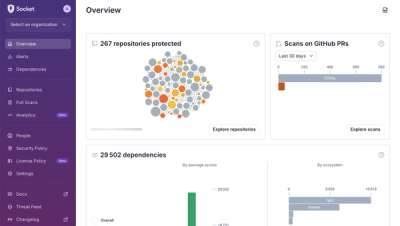
Product
A New Overview in our Dashboard
We redesigned Socket's first logged-in page to display rich and insightful visualizations about your repositories protected against supply chain threats.
closest-file-data
Advanced tools
Allow to find and retrieve some data (such as config file) related to a given path (with cache)
![]()
A NodeJS module to find and retrieve data (such as config) related to a given path. No dependencies. Implements caching.
// some/project/path
// ├── package.json
// └── src
// ├── index.js
// └── utils
// └── dummy.js
const pkg = closestFileData(
'/some/project/path/src/utils/dummy.js',
{basename: 'package.json', read: require}
);
console.log(pkg.version);
Let's say you want to find some config data related to a given file. We'll take BabelJS for example. Their config can be
a JSON file in .babelrc, or a JS file in .babelrc.js, or even in the babel key of package.json.
Now you are given the path of a file and you want to get the Babel config closest to that file... what a mess!
Well, with this module now you can safely do:
import closestFileData from 'closest-file-data';
const babelReaders = [
// each line represents what is called a reader (see below):
{ basename: '.babelrc', read: f => JSON.parse(readFileSync(f, 'utf-8')) },
{ basename: '.babelrc.js', read: f => require(f) },
{ basename: 'package.json', read: f => require(f).babel },
];
const config = closestFileData('/path/to/some/deep/file.js', babelReaders);
// `config` will be either the object representing the first config data found,
// or `undefined` if no configuration found.
reader?A reader is an object with 2 properties:
basename: the basename of the file for which the read will be called with.read: a method that should return either the data read for given file, or undefined if the read should
be considered without result (useful in the Babel case for example when there is no babel key in the package.json).The second parameter to closestFileData() can be a single reader or an array of readers.
It will try a find a file with name basename in the given path (first argument of closestFileData) for each
given reader, until one returns something else then undefined. If none, it'll go up one directory and start again,
until it reaches the root of the filesystem.
Yup, the cache is different per list of base names files in the set of readers given to closestFileData().
You can also clear the cache if needed for testing purpose:
import closestFileData from 'closest-file-data';
// ...
closestFileData.cache.clear();
Add to your project with npm:
npm install --save closest-file-data
or with yarn:
yarn add closest-file-data
End with an example of getting some data out of the system or using it for a little demo
You need to get a copy of the repository to run unit and integration tests:
git clone https://github.com/huafu/closest-file-data.git
cd closest-file-data
npm run test
test:unit: run tests using the typescript source in src, useful while developing.test:dist: run tests using the built js version in dist, needs to have ran build before.test:e2e: run real World tests without mocking the file-system, using the built js version in dist. Needs to have ran build before.The test script run them all and takes care of building the sources before.
Pull requests welcome!
We use SemVer for versioning. For the versions available, see the tags on this repository.
See also the list of contributors who participated in this project.
This project is licensed under the MIT License - see the LICENSE.md file for details
Hey dude! Help me out for a couple of :beers:!
FAQs
Allow to find and retrieve some data (such as config file) related to a given path (with cache)
The npm package closest-file-data receives a total of 20,060 weekly downloads. As such, closest-file-data popularity was classified as popular.
We found that closest-file-data demonstrated a not healthy version release cadence and project activity because the last version was released a year ago. It has 1 open source maintainer collaborating on the project.
Did you know?

Socket for GitHub automatically highlights issues in each pull request and monitors the health of all your open source dependencies. Discover the contents of your packages and block harmful activity before you install or update your dependencies.

Product
We redesigned Socket's first logged-in page to display rich and insightful visualizations about your repositories protected against supply chain threats.

Product
Automatically fix and test dependency updates with socket fix—a new CLI tool that turns CVE alerts into safe, automated upgrades.

Security News
CISA denies CVE funding issues amid backlash over a new CVE foundation formed by board members, raising concerns about transparency and program governance.